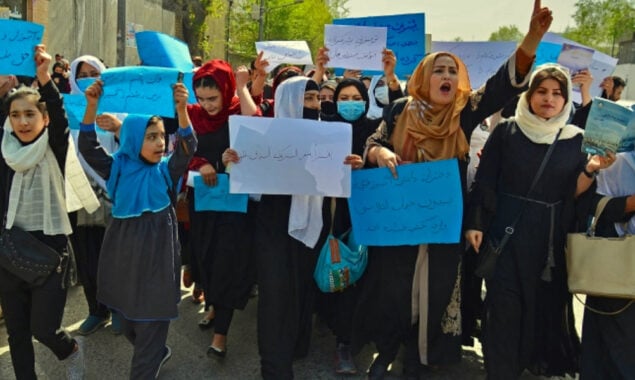India’s civil aviation bars 90 SpiceJet pilots
An Indian aviation body has ordered 90 SpiceJet pilots to undergo mandatory...

As the Taliban ban on female education demonstrates, the movement’s ultra-conservatives still have tight control of the Islamist organisation and reveals a power struggle, analysts believe.
An worldwide outcry has been sparked by the restriction, which has left many in the Taliban organisation perplexed.
Senior Taliban members described the order as “devastating,” according to AFP. In other words, “the top dog himself became involved.”
Due to the sensitivity of the matter, all Taliban officials who talked to AFP on the subject requested anonymity.
After being reopened for the first time since the Taliban took control in August, girls’ secondary schools in Helmand were ordered closed last month.
After a secret meeting in Kandahar, the Taliban’s de facto power centre, the group’s leadership made the unexpected U-turn.
An official explanation for the restriction has never been given save to declare that females must be educated in accordance with “Islamic standards”.
“Ultra-conservative on this topic” is what one senior Taliban official tells AFP about Supreme Leader Hibatullah Akhundzada and other senior members.
He said that the movement had split into two distinct factions: the urban and the ultra-conservative.
Clerics such as Chief Justice Abdul Hakim Sharai, Minister for Religious Affairs Noor Mohammad Saqeb and Minister for Promotion of Virtue and Prevention of Vice Mohsen Khalid Hanafi are among the “ultra-conservatives” who won this round.
• Reinstating the effect of Kandahar
This “out-of-touch minority” has hindered the nation from going forward with something that the great majority of Afghans — including the majority of its leadership — favour, she told AFP.
According to Graeme Smith, International Crisis Group researcher, “it suggests that Kandahar remains the centre of gravity for Taliban politics.”
According to a senior Taliban member, the hardliners are seeking to placate the thousands of militants from the rural areas, who are known for their strict religious beliefs.
“Even if a lady leaves the confines of her house, it is considered immoral by them. Then, consider how much it matters to educate her “he said.
It was claimed by the Taliban that Akhundzada was opposed to “modern, secular education” because it was connected with the rule of Hamid Karzai and Ashraf Ghani, two former Western-backed presidents.
“That’s how he sees the world.”
The Taliban regained control of Afghanistan last year after the United States and its allies concluded an occupation that had been in place since an invasion in 2001.
Even though social conservatism persisted in the nation, girls were permitted to attend school and women were allowed to work in all industries under the Taliban’s 20-year rule.
Girls in Afghanistan have traditionally studied in single-sex courses, according to Tafsir Siyaposh, an activist and Islamic scholar. The prohibition demonstrates the Taliban only intended to “oppress the rights of women by creating reasons,” Siyaposh says.
It’s a blow to foreign funding, but a Taliban source in Pakistan revealed that there are disagreements in leadership over the subject.
However, “we are working hard to overcome our inadequacies,” he said.
A setback to Taliban worldwide reputation and attempts to gather assistance for Afghanistan’s humanitarian catastrophe, observers believe, notwithstanding the restriction.
In Jackson’s view, neither Akhundzada nor those closest to him “truly comprehended or recognised” the ramifications of their decree for an international community that has tied formal recognition to the group’s support for women’s rights.
Even some of the most senior Taliban leaders have come to this conclusion.
According to a Taliban official from Kandahar, “We are educating them (the ultraconservatives) that controlling a nation is different from operating a madrassa,” which is the name for an Islamic school.
“It seemed like everything was going as planned until this stern order was issued. We have no choice but to accept orders from our boss, but we are working to bring about a change “he said.
Smith, a member of the International Crisis Group (ICG), argued that the restriction diminishes nations’ desire to work with the Taliban.
They need to figure out who to talk to inside the Taliban.
Catch all the International News, Breaking News Event and Latest News Updates on The BOL News
Download The BOL News App to get the Daily News Update & Follow us on Google News.